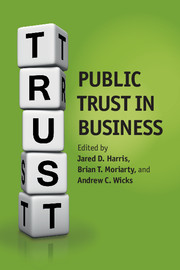Book contents
- Frontmatter
- Contents
- List of figures
- List of tables
- Notes on contributors
- Preface: discovering new territory in public trust in business
- Acknowledgments
- 1 Public trust in business: what’s the problem and why does it matter?
- Part I Trusting the institution of business
- Part II Public trust and business organizations
- 7 Public trust and trust in particular firm–stakeholder interactions: a theoretical model and implications for management
- 8 Creating more trusting and trustworthy organizations: exploring the foundations and benefits of presumptive trust
- 9 Building trust through reputation management
- 10 Can trust flourish where institutionalized distrust reigns?
- 11 Roles of third parties in trust repair: lessons from high-tech alliances for public trust
- 12 The repair of public trust following controllable or uncontrollable organizational failures: a conceptual framework
- 13 Toward a better understanding of public trust in business
- Index
- References
9 - Building trust through reputation management
Published online by Cambridge University Press: 05 July 2014
- Frontmatter
- Contents
- List of figures
- List of tables
- Notes on contributors
- Preface: discovering new territory in public trust in business
- Acknowledgments
- 1 Public trust in business: what’s the problem and why does it matter?
- Part I Trusting the institution of business
- Part II Public trust and business organizations
- 7 Public trust and trust in particular firm–stakeholder interactions: a theoretical model and implications for management
- 8 Creating more trusting and trustworthy organizations: exploring the foundations and benefits of presumptive trust
- 9 Building trust through reputation management
- 10 Can trust flourish where institutionalized distrust reigns?
- 11 Roles of third parties in trust repair: lessons from high-tech alliances for public trust
- 12 The repair of public trust following controllable or uncontrollable organizational failures: a conceptual framework
- 13 Toward a better understanding of public trust in business
- Index
- References
Summary
EXECUTIVE SUMMARY
the situation
Business scandals, coupled with the adoption of digital communications platforms such as social networks, have created a perfect storm of distrust. Never has there been such public awareness of corporate malfeasance, and never have there been so many channels through which constituents can voice their concerns.
key questions
What is the relationship between trust and reputation? How can social media affect the erosion of trust? What is the importance of authenticity in times of crisis? How can poor leadership escalate a reputational crisis?
new knowledge
Identity is the only part of reputation management that an organization can actually create and control. It is critical that identity be strategically shaped.
Stakeholders’ access to social media tools lends them a profound ability to impact a business’s success or failure.
Reputation is a source of tangible economic value in terms of analyst valuations and stock performance. The less tangible aspects of a strong reputation can also result in competitive advantage. Companies with strong reputations attract and retain the best talent, as well as loyal customers and business partners, all of which contribute positively to growth and success.
Information
- Type
- Chapter
- Information
- Public Trust in Business , pp. 236 - 265Publisher: Cambridge University PressPrint publication year: 2014
References
Accessibility standard: Unknown
Why this information is here
This section outlines the accessibility features of this content - including support for screen readers, full keyboard navigation and high-contrast display options. This may not be relevant for you.Accessibility Information
- 1
- Cited by
